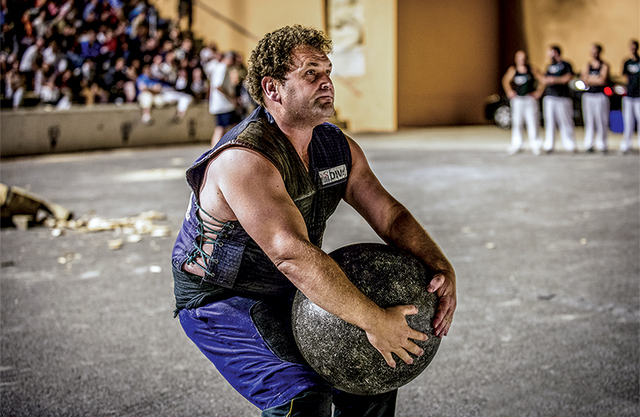
Harri-jasotze or Harri jasotzea (Basque Country, Spain)
- Name of sport (game): Harri-jasotze (Basque), levantamiento de Piedra (Spanish), leveurs de pierres (French), also known as Herri Kirolak.
- Name in native language: Basque: harri – stone, jaso – to lift; Spanish: levantamiento de Piedra (to lift a stone)
- Place of practice (continent, state, nation):
Europe, mainly on the border between Spain and France (former Basque territories).
- History:
This sport has its roots in prehistoric times, when people had to carry huge stones for construction. Later, people began to compete with each other in lifting stones. Even though the lifting of stones is deeply rooted in the Basque culture, the first historical information about such competition comes from the end of the last century. There are some exceptions, because the information collected by historians in the archives shows that the competition in lifting stones was already in the 16th century – probably even earlier. The first mention of this popular sport refers to successes of Arteondo, who was born in 1886. Thanks to him, the size and weight of stones were determined.
- Description:
The player must lift the stone, which is lying in front of him, to the height of the arms and then throw it ahead. It should be remembered that all the players never lift stones at once, but in turn. Two judges take part in the competition: one measures the time and the other judges if the stone has been lifted correctly. Very often the audience, like the number of hits in the volleyball, screams how many times the stone has been lifted. There are two rules of the game: in the first the game wins the person who lifted the stone the most times at the specified time. In the second one players lift heavier and heavier stones – in this case, the winner is the one who lifts the heaviest stone.
All competitions and tournaments are held in four categories. Each one uses stones of different shapes and masses (traditionally, they are given in arobs, 1 arroba = 12.5 kg):
a) zilindroa (cylinder) - 8-10 arroba (100-125 kg),
b) laukizuzena (rectangle) - 10-17 arroba (125-212.5 kg),
c) kuboa (cube) - 10-17 arroba (125-212.5 kg),
d) bibibila (sphere) - 9-10 arroba (112.5-125 kg).Natural stone is the most commonly used, although the best material for stones is considered to be dark graphite, mined near the cities of Zumarraga and Lastur in Gipuzkoa (Spanish province that is one of the province creators of the autonomous Basque Country) – also known as harri beltza.
- Current status:
Today both trainings and official competitions in harri-jasotze are held very often. The current world record belongs to Mieltx Saralega, who picked up a stone weighing 329 kg. Interesting fact it that women also play this sport, although the categories and stone sizes remain the same.
Similar sports also exist in other countries:
• clachan-ultaich in Scotland
• Hálfdrættingur in Iceland
• Stoalupfn in Bavaria
• Gŵyl Mabsant (Saint's Day) in Wales
• Dash kodirer (Даш кодурер) in Russia (Tuva Republic)
• Chikaraishi in Japan
- Contacts:
http://www.herrikirolak.eus/language/eu/hasiera/ – Basque Sports Federation (available in Spanish and Basque)
http://www.herrikirolaknafarroa.org/ – Federation of Herri Kirol in Navarre (Spanish: Nafarroako Herri Kirol Federazioa) - Sources of information :
http://www.euskonews.com/0045zbk/frgaia.htm
Ainhoa Irazu, Levantadores de piedra: más duros que la piedra
http://www.sportinstytut.pl/uploads/Reglamento_levantamientodepiedra.pdf – rules of the sport (Spanish)
https://www.flickr.com/photos/pedales/sets/72157627099504353/ – photos from competitionsVideo:
https://www.youtube.com/watch?v=p99JauIKUJQ
https://www.youtube.com/watch?v=1WFR0V13nlg
https://www.youtube.com/watch?v=wIcLDp88sKM - Gallery:
- Documents:

